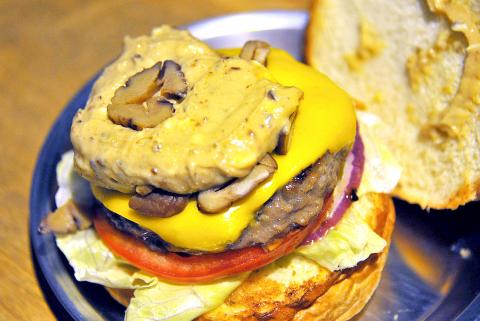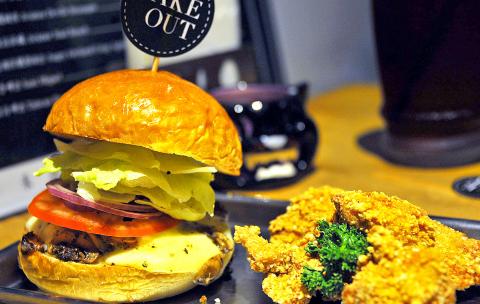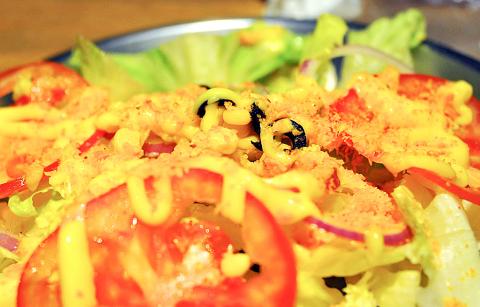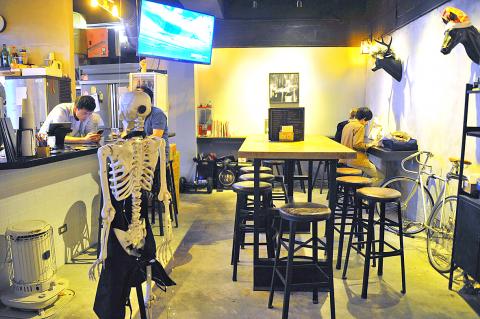The first thing I did when I walked into Take Out Burger, a small bar-style joint in the Liuzhangli (六張犁) area, was to try and figure out the decorations in the otherwise industrial-chic space.
Visitors are greeted by a skeleton in a black dress standing in the middle of the stone floor (staff says they change its outfit every now and then), and there are black horse and deer busts on the wall, one wearing a Santa hat with Chinese-style patterns and the other a silver wig. The garbage area is guarded by a large Moai statue, its stern presence reminding you to put the recyclables in the right bin.
It’s curious why this place is called Take Out — burgers and fried food are best eaten in the store, otherwise they get cold and soggy. Anyhow, the menu is eclectic, but not as offbeat as the decor. While the featured burger is an intriguing sweet Tianjin chestnut cream cheese creation (NT$200), the rest of the burgers are pretty tame, including spicy Mexican (NT$200), onion ring spicy meat sauce (NT$220) and the ubiquitous peanut butter burger (NT$180).

Photo: Han Cheung, Taipei Times
The store seems to rotate the featured burger monthly, and I’m glad I didn’t come last month because it was laden with parsley (which I personally abhor). They also have a wonderful selection of craft beer including Brooklyn, North Coast and local brewery Alechemist. There’s also Taiwan Beer for the less choosy.
I’ve fallen victim to novelty burgers before, but it’s still hard to resist ordering the sweet chestnut burger our of curiosity. To be fair to the restaurant, we also order the standard Mozzarella mushroom burger (NT$220). There are six sets — we choose B (NT$85) which comes with a drink and basil fried chicken, and E (NT$110) which comes with a drink and salad. Patrons can also add items a la carte to the burger and salad (between NT$20 and NT$60).
I’m biased against iceberg lettuce — it’s tasteless and watery — but it seems to be the the standard for side salads everywhere you go. It is topped with tomatoes, onions, corn, olives and what seems to be crumbled cheddar Doritos. I chose the mango dressing — which was too sweet as I had expected a little more tang. The dish overall was pretty pedestrian, although I enjoyed the Dorito toppings, which provided crunch, saltiness and a nice cheesy aftertaste to balance out the sweet dressing.

Photo: Han Cheung, Taipei Times
The sweetness overload continued with the chestnut burger as the cream cheese did not taste like cheese, but more like chestnut cream found on a cake. Coupled with the also sweet-leaning toasted brioche bun — which smelled pleasantly buttery and was crisp and firm on the outside — if felt like I was eating a dessert pastry instead. The generous handmade beef patty was excellent with just the right amount of juiciness and firmness, but its taste was overshadowed by the chestnut, which has strong overtones that linger on the palate.
The restaurant provides plastic gloves for those who don’t want to dirty their fingers — and trust me, you’ll need it for the chestnut burger.
This is why you never judge a restaurant by its novelty creations, because the Mozzarella burger was pretty enjoyable. It wasn’t anything special, but the flavors and textures made sense as a whole — and I could taste the bread and the meat for what they really were. Unfortunately, the patty was a little uneven, unlike the one in the chestnut burger. The mushrooms were the best feature — they were lightly seasoned (probably just pepper with a tiny dash of salt) and cooked just enough that they still retained firmness. Usually, mushrooms in burgers are softer and serve more as a complement, but these ones stood out, obvious in each bite.

Photo: Han Cheung, Taipei Times
Finally, there was the chicken — which, interestingly, tasted exactly like Taiwanese-style popcorn chicken (鹽酥雞), from the use of basil to the crunchy breading. Actually, it was much better than the stuff you get from the street, coming in larger pieces and the meat being much more succulent and juicy.
I probably should have tried one of their spicy meat sauce burgers, which many people have praised on the Internet. Maybe I’ll come back when they have another featured burger that catches my eye.

Photo: Han Cheung, Taipei Times

April 14 to April 20 In March 1947, Sising Katadrepan urged the government to drop the “high mountain people” (高山族) designation for Indigenous Taiwanese and refer to them as “Taiwan people” (台灣族). He considered the term derogatory, arguing that it made them sound like animals. The Taiwan Provincial Government agreed to stop using the term, stating that Indigenous Taiwanese suffered all sorts of discrimination and oppression under the Japanese and were forced to live in the mountains as outsiders to society. Now, under the new regime, they would be seen as equals, thus they should be henceforth

Last week, the the National Immigration Agency (NIA) told the legislature that more than 10,000 naturalized Taiwanese citizens from the People’s Republic of China (PRC) risked having their citizenship revoked if they failed to provide proof that they had renounced their Chinese household registration within the next three months. Renunciation is required under the Act Governing Relations Between the People of the Taiwan Area and the Mainland Area (臺灣地區與大陸地區人民關係條例), as amended in 2004, though it was only a legal requirement after 2000. Prior to that, it had been only an administrative requirement since the Nationality Act (國籍法) was established in

Three big changes have transformed the landscape of Taiwan’s local patronage factions: Increasing Democratic Progressive Party (DPP) involvement, rising new factions and the Chinese Nationalist Party’s (KMT) significantly weakened control. GREEN FACTIONS It is said that “south of the Zhuoshui River (濁水溪), there is no blue-green divide,” meaning that from Yunlin County south there is no difference between KMT and DPP politicians. This is not always true, but there is more than a grain of truth to it. Traditionally, DPP factions are viewed as national entities, with their primary function to secure plum positions in the party and government. This is not unusual

US President Donald Trump’s bid to take back control of the Panama Canal has put his counterpart Jose Raul Mulino in a difficult position and revived fears in the Central American country that US military bases will return. After Trump vowed to reclaim the interoceanic waterway from Chinese influence, US Defense Secretary Pete Hegseth signed an agreement with the Mulino administration last week for the US to deploy troops in areas adjacent to the canal. For more than two decades, after handing over control of the strategically vital waterway to Panama in 1999 and dismantling the bases that protected it, Washington has